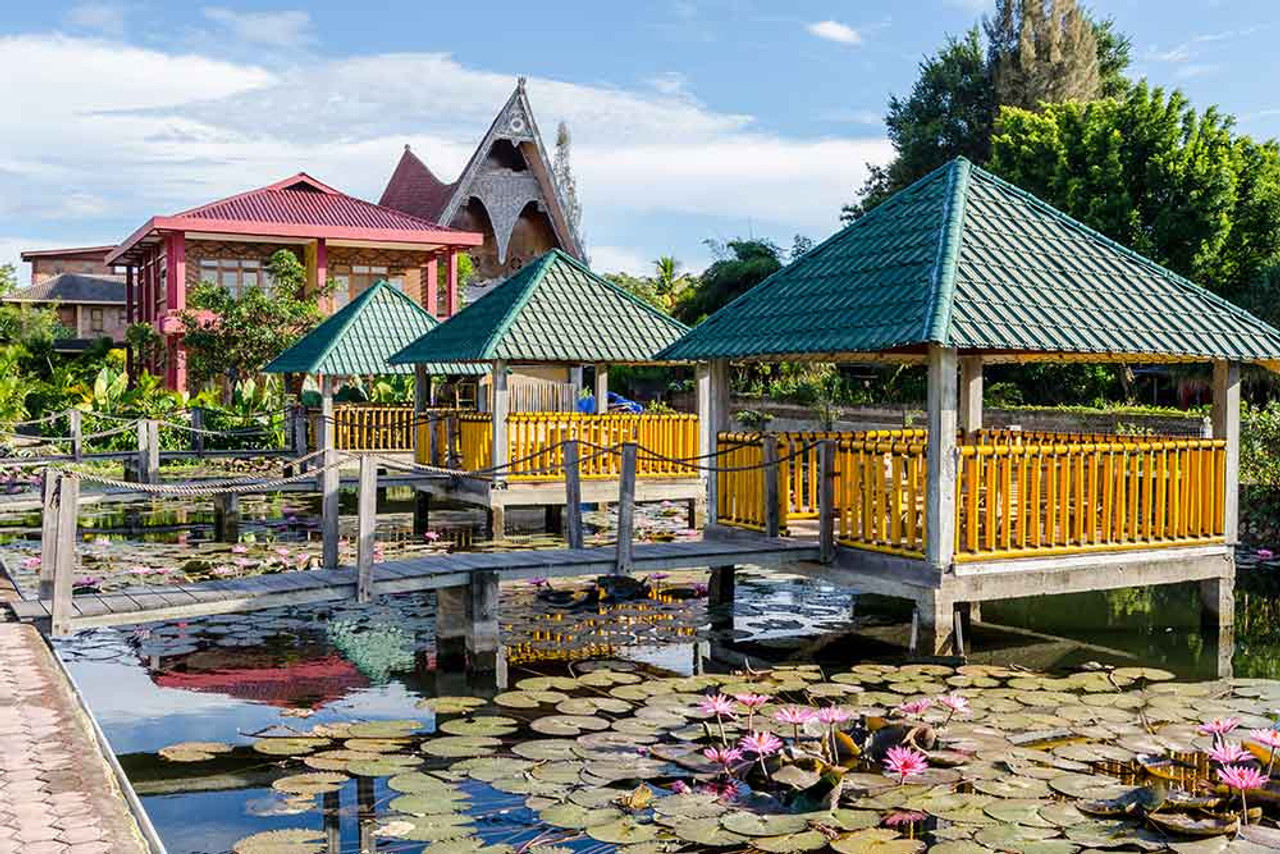The Benefits Of Constructing Floating Islands in Your Pond
Apr 19th 2024

Apr 19th 2024

There are a number of ways in which backyard ponds can be designed, and one option is the addition of a floating island. While this design feature requires lots of space and a larger pond than usual, it provides a number of key benefits, and as such is worth the time and expense.
A floating island is a landmass that appears in a body of water. They are typically associated with rivers and lakes, and although they do occur naturally, it is also possible for such structures to be manmade. They are pleasing to the eyes, and if large enough, can even be used for temporary work or living purposes. They also provide a degree of security and privacy since they are inaccessible by foot and anyone approaching by boat would be readily visible.
Aside from being visually attractive, floating islands are excellent for ponds since they will boost the water quality naturally. They will also create an excellent habitat for your fish while simultaneously reducing bank erosion. Furthermore, they serve as a protection against mosquitoes. However, to get the most from these structures, it is essential that you design and construct them correctly.
You will first need to evaluate your existing pond carefully. If it is too small, adding an island will be out of the question. These structures are best for ponds which are medium to large in size, at least half an acre. If the pond is already well aerated, this means that after constructing the island you can grow virtually anything you want on it, including flowers and shrubs. If your pond is not sufficiently aerated, you will want to aim for wetland plants to produce a look that is more natural.
Floating islands will usually mature or sprout faster during spring. By fall, any foliage which is present will remain green for longer due to the aquatic thermal effects of the pond water nearby. As a consequence, owners can craft a strategy of planting where they can either repel birds or attract them. If birds are attracted to your island, this will result in an area which is separate where fish can be fed without having to worry about predation by blue heron or geese.
Once constructed, the floating island, like the pond itself, will require ongoing maintenance. If the pond is subject to either elevated nutrient load due to lawn fertilizer or run off from storms, floating islands will combat these problems by mining the nutrients from the water. The nutrients will then be transformed into a habitat that is cleaner and more attractive. Bank erosion will also be reduced since the presence of the island will break up the waves that would usually come into contact with the bank.
| Hours | |
|---|---|
| sunday | 10:00-5:00 |
| monday | 9:00-6:00 |
| tuesday | 9:00-6:00 |
| wednesday | 9:00-6:00 |
| thursday | 9:00-6:00 |
| friday | 9:00-6:00 |
| saturday | 9:00-6:00 |
| Hours | |
|---|---|
| sunday | 10:00-5:00 |
| monday | 9:00-6:00 |
| tuesday | 9:00-6:00 |
| wednesday | 9:00-6:00 |
| thursday | 9:00-6:00 |
| friday | 9:00-6:00 |
| saturday | 9:00-6:00 |
| Hours | |
|---|---|
| sunday | 10:00-5:00 |
| monday | 9:00-6:00 |
| tuesday | 9:00-6:00 |
| wednesday | 9:00-6:00 |
| thursday | 9:00-6:00 |
| friday | 9:00-6:00 |
| saturday | 9:00-6:00 |
| Hours | |
|---|---|
| sunday | 10:00-5:00 |
| monday | 9:00-6:00 |
| tuesday | 9:00-6:00 |
| wednesday | 9:00-6:00 |
| thursday | 9:00-6:00 |
| friday | 9:00-6:00 |
| saturday | 9:00-6:00 |
| Hours | |
|---|---|
| sunday | Closed |
| monday | 9:00-5:00 |
| tuesday | 9:00-5:00 |
| wednesday | 9:00-5:00 |
| thursday | 9:00-5:00 |
| friday | 9:00-5:00 |
| saturday | Closed |





| Hours | |
|---|---|
| sunday | 10:00-5:00 |
| monday | 9:00-6:00 |
| tuesday | 9:00-6:00 |
| wednesday | 9:00-6:00 |
| thursday | 9:00-6:00 |
| friday | 9:00-6:00 |
| saturday | 9:00-6:00 |
| Hours | |
|---|---|
| sunday | 10:00-5:00 |
| monday | 9:00-6:00 |
| tuesday | 9:00-6:00 |
| wednesday | 9:00-6:00 |
| thursday | 9:00-6:00 |
| friday | 9:00-6:00 |
| saturday | 9:00-6:00 |
| Hours | |
|---|---|
| sunday | 10:00-5:00 |
| monday | 9:00-6:00 |
| tuesday | 9:00-6:00 |
| wednesday | 9:00-6:00 |
| thursday | 9:00-6:00 |
| friday | 9:00-6:00 |
| saturday | 9:00-6:00 |
| Hours | |
|---|---|
| sunday | 10:00-5:00 |
| monday | 9:00-6:00 |
| tuesday | 9:00-6:00 |
| wednesday | 9:00-6:00 |
| thursday | 9:00-6:00 |
| friday | 9:00-6:00 |
| saturday | 9:00-6:00 |
| Hours | |
|---|---|
| sunday | Closed |
| monday | 9:00-5:00 |
| tuesday | 9:00-5:00 |
| wednesday | 9:00-5:00 |
| thursday | 9:00-5:00 |
| friday | 9:00-5:00 |
| saturday | Closed |
